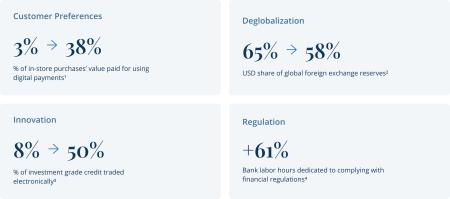What Is Financial Infrastructure?
Discover the moving parts and players in the financial infrastructure universe.
Financial Infrastructure
Financial infrastructure is to the 21st century what picks and shovels were to the gold rush. It enables smooth and efficient operations for companies that serve as the backbone of the global financial system.
As the world continues to innovate, consumers, businesses and governments will increasingly demand more. Businesses across industries like payments, capital markets, banking technology and wealth management must transform from analog systems to new-age digital operations so that they can not only keep up, but also thrive.
Investing in companies' financial infrastructure will help them grow and build market-leading platforms. But it also has the potential to allow investors to capture the benefits of both industry growth tailwinds and value creation in their private equity portfolios.
Discover the moving parts and players in the financial infrastructure universe.
Explore the key trends driving the need for investment in the world’s financial infrastructure.
The global financial system is in the midst of a structural transition driven by changing consumer preferences, deglobalization, innovation and regulation. These trends are creating a need for strategic, large-scale capital paired with operating expertise to help financial infrastructure companies prepare for this transformation.



Endnotes
1. Worldpay, “Global Payments Report," 2025. Time period from 2014 to 2024.
2. IMF. Time period from 2014 to 2024.
3. https://www.tradeweb.com/newsroom/media-center/insights/commentary/elec… and https://www.tradeweb.com/newsroom/media-center/insights/blog/what-the-l…. Time period from 2013 to 2024.
4. https://bpi.com/survey-finds-compliance-is-growing-demand-on-bank-resou…. Time period from 2016 to 2023.
Disclosures
All investing involves risk. The value of an investment will fluctuate over time, and an investor may gain or lose money, or the entire investment. Past performance is no guarantee of future results.
Financial infrastructure companies may be subject to a variety of factors that may adversely affect their business, including interest rate fluctuations, high leverage, regulatory risks, economic slowdown and increased competition.
